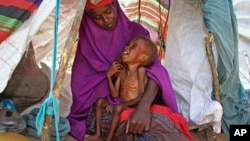The World Food Program warns millions of people around the world are going to bed on an empty stomach because the cost of feeding them is escalating due to conflict, instability and other complex emergencies.
In its just released World Food Assistance 2017 report, the World Food Program reports humanitarian needs and complex global emergencies are growing, as is the cost of feeding the hungry. WFP spokeswoman Bettina Luescher says some 800 million people globally are going hungry.
She says many are caught in conflict or natural disasters. Others, she says, are silently wasting away in the absence of media and the publicity needed to expose their plight.
“We know how to end hunger, but all of our efforts are so often hampered, blocked, impeded because there is fighting going on. And, that to me is like a big tragedy,” Luescher said.
The WFP reports the cost of providing food aid has gone up by more than 140 percent from $2.2 billion in 2009 to $5.3 billion in 2015. Luescher says the amount of money needed for humanitarian programs this year is expected to climb to more than $9 billion.
“If we had better access, WFP could save $1 billion each year. If there were no climate shocks, if there were no political crises, if there were no conflicts or economic shock, we could save $2.2 billion each year. And, if there were better food systems in each country, then we could save $440 million each year,” Luescher said.
WFP reports two regions - eastern and central Africa and the Middle East and North Africa - account for 70 percent of the agency's expenditures. It says nearly one-third of its budget will go for humanitarian assistance to four countries struggling to stave off famine - Nigeria, Somalia, South Sudan and Yemen.




